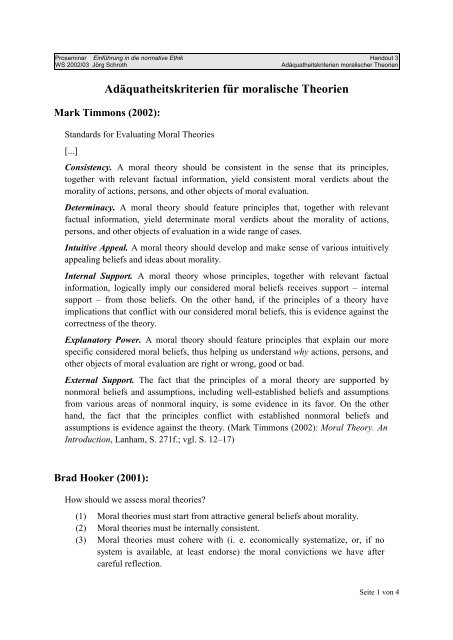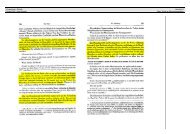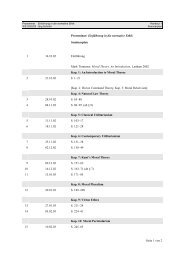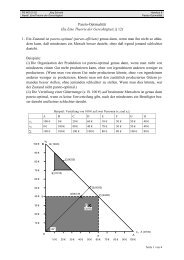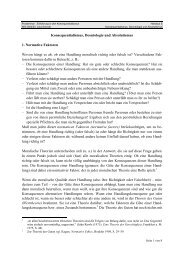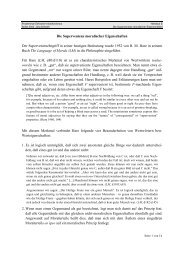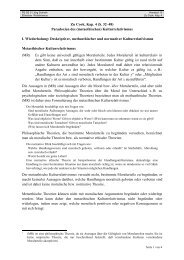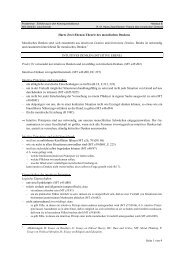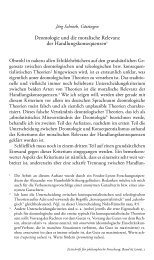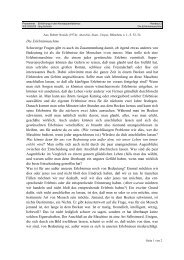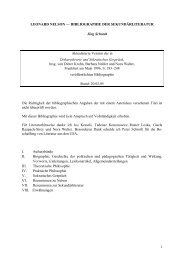Adäquatheitskriterien für moralische Theorien - Jörg Schroth
Adäquatheitskriterien für moralische Theorien - Jörg Schroth
Adäquatheitskriterien für moralische Theorien - Jörg Schroth
Create successful ePaper yourself
Turn your PDF publications into a flip-book with our unique Google optimized e-Paper software.
Proseminar Einführung in die normative Ethik Handout 3<br />
WS 2002/03 <strong>Jörg</strong> <strong>Schroth</strong> <strong>Adäquatheitskriterien</strong> <strong>moralische</strong>r <strong>Theorien</strong><br />
<strong>Adäquatheitskriterien</strong> <strong>für</strong> <strong>moralische</strong> <strong>Theorien</strong><br />
Mark Timmons (2002):<br />
Standards for Evaluating Moral Theories<br />
[...]<br />
Consistency. A moral theory should be consistent in the sense that its principles,<br />
together with relevant factual information, yield consistent moral verdicts about the<br />
morality of actions, persons, and other objects of moral evaluation.<br />
Determinacy. Amoral theory should feature principles that, together with relevant<br />
factual information, yield determinate moral verdicts about the morality of actions,<br />
persons, and other objects of evaluation in a wide range of cases.<br />
Intuitive Appeal. Amoral theory should develop and make sense of various intuitively<br />
appealing beliefs and ideas about morality.<br />
Internal Support. A moral theory whose principles, together with relevant factual<br />
information, logically imply our considered moral beliefs receives support –internal<br />
support –from those beliefs. On the other hand, if the principles of atheory have<br />
implications that conflict with our considered moral beliefs, this is evidence against the<br />
correctness of the theory.<br />
Explanatory Power. Amoral theory should feature principles that explain our more<br />
specific considered moral beliefs, thus helping us understand why actions, persons, and<br />
other objects of moral evaluation are right or wrong, good or bad.<br />
External Support. The fact that the principles of amoral theory are supported by<br />
nonmoral beliefs and assumptions, including well-established beliefs and assumptions<br />
from various areas of nonmoral inquiry, is some evidence in its favor. On the other<br />
hand, the fact that the principles conflict with established nonmoral beliefs and<br />
assumptions is evidence against the theory. (Mark Timmons (2002): Moral Theory. An<br />
Introduction, Lanham, S. 271f.; vgl. S. 12–17)<br />
Brad Hooker (2001):<br />
How should we assess moral theories?<br />
(1) Moral theories must start from attractive general beliefs about morality.<br />
(2) Moral theories must be internally consistent.<br />
(3) Moral theories must cohere with (i. e. economically systematize, or, if no<br />
system is available, at least endorse) the moral convictions we have after<br />
careful reflection.<br />
Seite 1 von 4
Proseminar Einführung in die normative Ethik Handout 3<br />
WS 2002/03 <strong>Jörg</strong> <strong>Schroth</strong> <strong>Adäquatheitskriterien</strong> <strong>moralische</strong>r <strong>Theorien</strong><br />
(4) Moral theories should identify afundamental principle that both (a) explains<br />
why our more specific considered moral convictions are correct and (b)<br />
justifies them from an impartial point of view.<br />
(5) Moral theories should help us deal with moral questions about which we are<br />
not confident, or do not agree. (Brad Hooker, Ideal Code, Real World, Oxford<br />
2001, S. 4)<br />
Tom L. Beauchamp/James F. Childress (1994)<br />
Awell-developed ethical theory provides aframework within which agents can reflect<br />
on the acceptability of actions and can evaluate moral judgments and moral character.<br />
[...]<br />
Criteria for Theory Construction<br />
We begin with eight conditions of adequacy for an ethical theory. These proposals for<br />
theory construction set forth exemplary conditions for theories, but not so exemplary<br />
that atheory could not satisfy them. That all available theories only partially satisfy the<br />
demands in these conditions is not of concern here. The objective is to provide abasis<br />
from which to assess the defects and the strengths of theories. Satisfaction of these<br />
conditions protects a theory from criticism as a mere list of disconnected norms<br />
generated from our pretheoretic beliefs. The same general criteria of success in amoral<br />
theory can be used for any type of theory (for example, ascientific theory or apolitical<br />
theory). The eight conditions that follow express these criteria.<br />
1. Clarity. First, atheory should be as clear as possible, as awhole and in its parts.<br />
Although we can expect only as much precision of language as is appropriate, more<br />
obscurity and vagueness exists in the literature of ethical theory and biomedical ethics<br />
than is necessary or justified by the subject matter.<br />
2. Coherence. Second, an ethical theory should be internally coherent. There should be<br />
neither conceptual inconsistencies (for example, “strong medical paternalism is justified<br />
only by consent of the patient”) nor contradictory statements (for example, “to be<br />
virtuous is amoral obligation, but virtuous conduct is not obligatory”). [...] However,<br />
consistency is not asufficient condition of agood theory, only anecessary condition. If<br />
an account has implications that are incoherent with other established parts of the<br />
account, some aspect of the theory needs to be changed in away that does not produce<br />
further incoherence. [...]<br />
3. Completeness and Comprehensiveness. A theory should be as complete and<br />
comprehensive as possible. Atheory would be entirely comprehensive if it included all<br />
moral values. Any theory that includes fewer moral values will be somewhere on a<br />
continuum from partially complete to void of important values. [...]<br />
Seite 2 von 4
Proseminar Einführung in die normative Ethik Handout 3<br />
WS 2002/03 <strong>Jörg</strong> <strong>Schroth</strong> <strong>Adäquatheitskriterien</strong> <strong>moralische</strong>r <strong>Theorien</strong><br />
4. Simplicity. If atheorywith afew basic norms generates sufficient moral content, then<br />
that theoryis preferable to atheorywith more norms but no additional content. Atheory<br />
should have no more norms than are necessary, and no more than people can use<br />
without confusion. However, morality is complicated, and any comprehensive moral<br />
theory will be immensely complex. We can demand only as much simplicity in amoral<br />
theory as its subject matter permits.<br />
5. Explanatory Power. Atheory has explanatory power when it provides enough insight<br />
to help us understand the moral life: its purpose, its objective or subjective status, how<br />
rights are related to obligations, and the like.<br />
6. Justificatory Power. Atheory should also give us grounds for justified belief, not a<br />
reformulation of beliefs we already possess. For example, the distinction between acts<br />
and omissions underlies many critical beliefs in biomedical ethics, such as the belief that<br />
killing is impermissible and allowing to die permissible. But amoral theory would be<br />
impoverished if it only expressed this distinction without determining whether the<br />
distinction justifiably grounds those beliefs. Agood theory also should have the power<br />
to criticize defective beliefs, no matter how widely accepted those beliefs may be.<br />
7. Output Power. Atheory has output power when it produces judgments that were not<br />
in the original data base of particular and general considered judgments on which the<br />
theorywas constructed. If atheorydid no more than repeat the list of judgments thought<br />
to be sound prior to the construction of the theory, nothing would have been<br />
accomplished. For example, if the parts of a theory pertaining to obligations of<br />
beneficence do not yield new judgments about role obligations of care in medicine<br />
beyond those assumed in constructing the theory, this failure of output suggests that the<br />
theory is purely aclassification scheme. Atheory, then, must generate more than alist<br />
of the axioms present in pretheoretic belief.<br />
8. Practicability. Aproposed moral theory is unacceptable if its requirements are so<br />
demanding that they probably cannot be satisfied or could be satisfied by only afew<br />
extraordinary persons or communities. Amoral theory that presents utopian ideals,<br />
paltry expectations, or unfeasible recommendations fails the criterion of practicability.<br />
For example, if atheory proposed such high requirements for personal autonomy[...] or<br />
such lofty standards of social justice [...] that, realistically, no person could be<br />
autonomous and no society could be just, the proposed theory would be deeply<br />
defective.<br />
Other general criteria could be formulated, but the eight sketched above are the most<br />
important for our purposes. Atheory can receive ahigh score on the basis of one<br />
criterion and alow score on the basis of another. For example, early in this chapter<br />
utilitarianism is depicted as an internally coherent, simple, and comprehensive theory<br />
with exceptional output power, yet it is not coherent with some of our vital considered<br />
judgments, especially with certain judgments about justice, human rights, and the<br />
importance of personal projects. By contrast, Kantian theories are consistent with many<br />
of our considered judgments, but their clarity, simplicity, and output power are limited.<br />
Seite 3 von 4
Proseminar Einführung in die normative Ethik Handout 3<br />
WS 2002/03 <strong>Jörg</strong> <strong>Schroth</strong> <strong>Adäquatheitskriterien</strong> <strong>moralische</strong>r <strong>Theorien</strong><br />
Acontested and appropriately criticized moral theory may nonetheless be defensible in<br />
light of the criteria we have proposed. Although we currently have no perfect or even<br />
best moral theory, several good theories are available. (Tom L. Beauchamp/James F.<br />
Childress (1994): Principles of Biomedical Ethics, 4. Aufl., Oxford, S. 44–47)<br />
Shelly Kagan (1989):<br />
In moral philosophy we want to apply the same sort of criteria that we use for theory<br />
building quite generally: we want our moral theory to have simplicity, power, and<br />
coherence.<br />
[...] roughly, amoral theory has simplicity if it yields abody of judgments out of a<br />
relatively sparse amount of theory, deriving the numerous complex variations of the<br />
phenomena from asmaller number of basic principles. [...] Amoral theory has power<br />
when it yields judgments not included in the original data base. [...] Coherence on this<br />
account can be taken as consistency [...]. (ShellyKagan, The Limits of Morality, Oxford<br />
1989, S. 11)<br />
We want the principles to hang together, to be mutually supportive, to be jointly<br />
illuminated by the moral concepts to which we appeal. [...] they must form, or be part<br />
of, a coherent moral theory.<br />
Seeing that the criterion of coherence is richer than that of mere consistencyshould also<br />
lead us to recognize the importance of afourth criterion for moral theories [...]: atheory<br />
must be explanatory. [...] even if the maxims form amutually consistent set, we still<br />
want our theory to provide an account of the distinctions, goals, restrictions, and the<br />
like, which they embody as well. An adequate justification for aset of principles<br />
requires an explanation of those principles –an explanation of why exactly these goals,<br />
restrictions, and so on, should be given weight, and not others. [...] Unless we can offer<br />
acoherent explanation of our principles (orshow that theyneed no further justification),<br />
we cannot consider them justified, and we may have reason to reject them.<br />
This need for explanation in moral theory cannot be overemphasized. We want our<br />
moral theory to help us to understand the moral realm. (Indeed, one of the things we<br />
want our moral theory to help us to understand is how there can even be amoral realm,<br />
and what sort of objective status it has.) Alarge part of the motivation for the criteria of<br />
simplicity and power is the drive to understand: by reducing the complex to the simple,<br />
we can hope to understand the complex; by having apowerful theory we can hope to<br />
move from a base which is understood to an understanding of new areas. Power,<br />
simplicity, and consistency are valuable in themselves, but it is the need to understand<br />
the moral realm which is, Ibelieve, paramount. Ultimately, unless we have acoherent<br />
explanation of our moral principles, we don’t have satisfactory ground for believing<br />
them to be true. (Shelly Kagan, The Limits of Morality, Oxford 1989, S. 12f.)<br />
Seite 4 von 4


